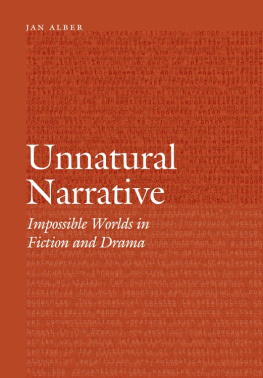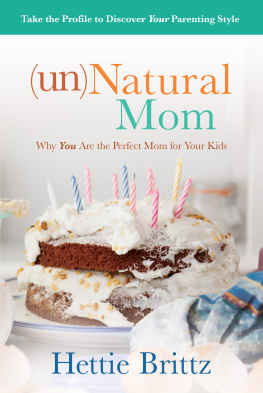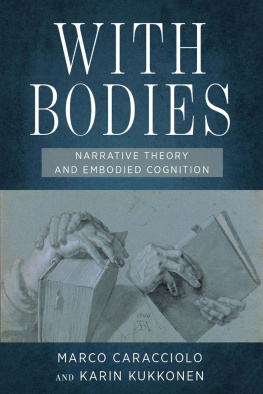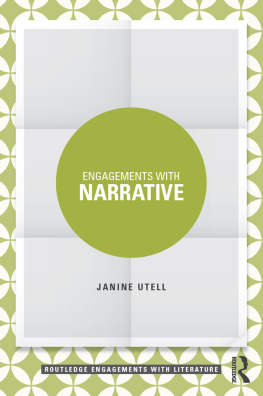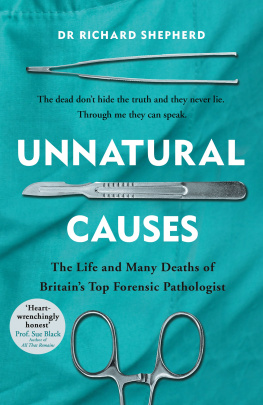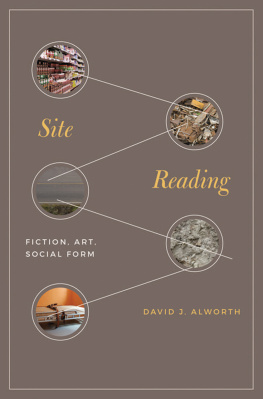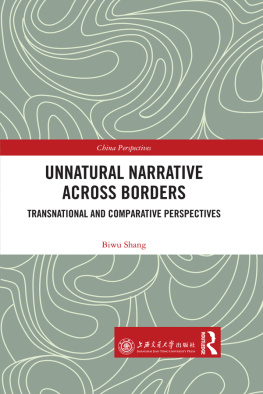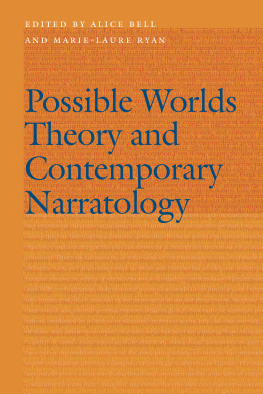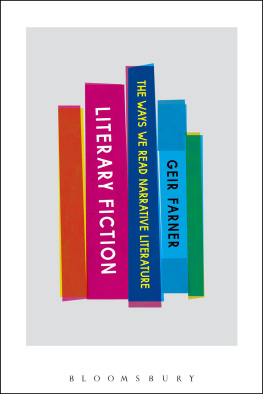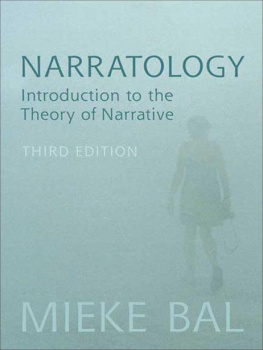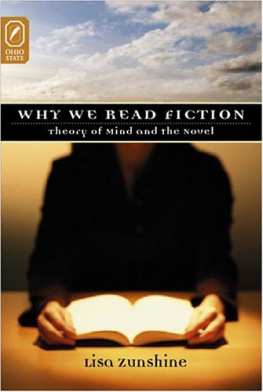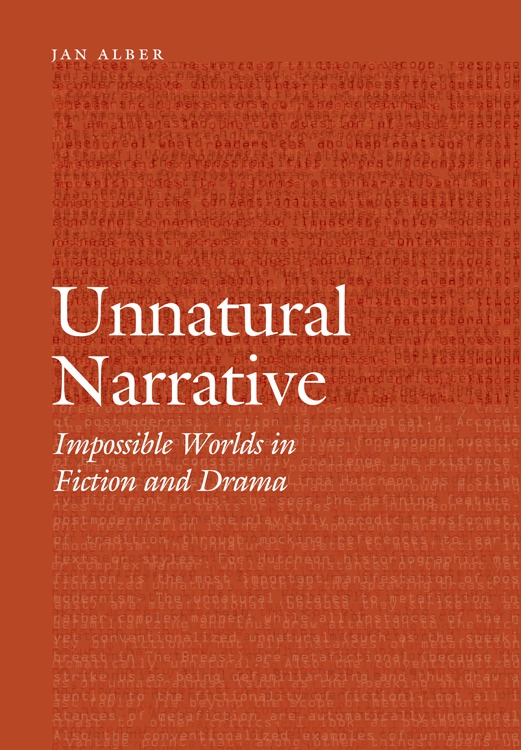Acknowledgments for the use of copyrighted material appear in , which constitutes an extension of the copyright page.
Unnatural narrative: impossible worlds in fiction and drama / Jan Alber.
pages cm. (Frontiers of narrative)
Includes bibliographical references and index.
ISBN 978-0-8032-7868-4 (cloth: alk. paper)
1. Narration (Rhetoric) 2. Uncanny, The (Psychoanalysis), in literature. 3. FictionHistory and criticism. 4. DramaHistory and criticism. 5.Postmodernism (Literature). I. Title.
PN 3383. N 35 A 53 2016
The publisher does not have any control over and does not assume any responsibility for author or third-party websites or their content.
This book includes parts of the following studies, which have previously appeared in journals, collections, handbooks, or encyclopedias:
Postmodernist Impossibilities, the Creation of New Cognitive Frames, and Attempts at Interpretation. In Beyond Classical Narration: Unnatural and Transmedial Narrative and Narratology, edited by Jan Alber and Per Krogh Hansen, 26180. Berlin: De Gruyter, 2014.
Unnatural Narrative. In The Living Handbook of Narratology, edited by Peter Hhn, John Pier, Wolf Schmid, and Jrg Schnert, 88795. Berlin: De Gruyter, 2014.
Unnatural Narrative Theory: The Systematic Study of Anti-Mimeticism. Literature Compass 10.5 (2013): 44960. 2013 by John Wiley & Sons, Ltd.
Unnatural Narratology and the Retrogressive Temporality in Martin Amiss Times Arrow. In New Approaches to Narrative: Cognition, Culture, History, edited by Vera Nnning, 4356. Trier: WVT , 2013.
Unnatural Narratology: Developments and Perspectives. Germanisch-Romanische Monatsschrift 63.1 (2013): 6984.
Unnatural Spaces and Narrative Worlds. In A Poetics of Unnatural Narrative, edited by Jan Alber, Henrik Skov Nielsen, and Brian Richardson, 4566. Columbus: Ohio State University Press, 2013.
Pre-Postmodernist Manifestations of the Unnatural: Instances of Expanded Consciousness in Omniscient Narration and Reflector-Mode Narratives. Zeitschrift fr Anglistik und Amerikanistik 61.2 (2013): 13753.
Reading Unnatural Narratives. Anglistik: International Journal of English Studies 24.2 (2013): 13550.
With Alice Bell. Ontological Metalepsis and Unnatural Narratology. Journal of Narrative Theory 42.2 (2012): 16692.
The Diachronic Development of Unnaturalness: A New View on Genre. In Unnatural Narratives, Unnatural Narratology, edited by Jan Alber and Rdiger Heinze, 4167. Berlin: De Gruyter, 2011.
With Stefan Iversen, Henrik Skov Nielsen, and Brian Richardson. Unnatural Narratives, Unnatural Narratology: Beyond Mimetic Models. Narrative 18.2 (2010): 11336.
Impossible Storyworldsand What to Do with Them. Storyworlds: A Journal of Narrative Studies 1 (2009): 7996.
Unnatural Narratives. In The Literary Encyclopedia. September 21, 2009. Online.
I want to thank the editors and publishers concerned for granting permission for these works to appear in the present volume.
I am also grateful to Marguerite Boyles, Kimberly Giambattisto, David Herman, Jesse Matz, Kristen Elias Rowley, Sabrina Stellrecht, the two readers, and everyone else at the University of Nebraska Press for all their help and hard work on the manuscript.
Furthermore, I would like to thank Monika Fludernik (University of Freiburg), David Herman (Ohio State University), Brian Richardson (University of Maryland), and Christian Moraru ( UNCG ), who have all helped me during the completion of this (unnatural) project. Monika Fludernik has provided me with invaluable comments on both the theoretical aspects and the corpus of this study. I admire her intellectual vigor as well as her immense knowledge of English literature, and I also want to thank her for the continuous trust that she has placed in me and my work over many years. I want to express my thanks to David Herman for extremely enlightening discussions of my reading strategies as well as the question of how the unnatural relates to other concepts. He is a very precise thinker, and I have learned a great deal from him. I would like to thank Brian Richardson for constantly highlighting the antimimetic potential of narratives and also for mentioning numerous unnatural texts to me. I greatly value his continuous interest in the deviant and nonconformist as well as his impressive knowledge of examples. Last but not least, I want to express my thanks to Christian Moraru for persistently reminding me of potentially problematic connotations of the term unnatural and also for making sure that this study is based on a pragmatic rather than a blind universality.
I am also indebted to numerous other scholars either because they have read parts of this manuscript or because they have discussed my ideas with me. Specifically I would like to thank Porter Abbott, Anita Albertsen, Frederick Aldama, Maximilian Alders, Risa Applegarth, Ridvan Askin, Christoph Bartsch, Alice Bell, Frauke Bode, Renate Brosch, Marco Caracciolo, Ben Clarke, Stephan Conermann, Jennifer Feather, Marina Grishakova, Per Krogh Hansen, Tony Harrison, Rdiger Heinze, Noelle Hewetson, Stefan Iversen, Irene Kacandes, Markus Kuhn, Karin Kukkonen, Maria Mkel, Andreas Mahler, Amit Marcus, Matas Martnez, Brian McHale, Jan-Christoph Meister, Henrik Skov Nielsen, Ansgar Nnning, Vera Nnning, Greta Olson, Andr Otto, Ruth Page, Alan Palmer, Ellen Peel, Bo Petterson, Jim Phelan, Jack Pier, Caroline Pirlet, Merja Polvinen, Catherine Romagnolo, Marie-Laure Ryan, Roy Sommer, Nancy Stewart, Pekka Tammi, Jan-Nol Thon, Jeff Thoss, Amy Vines, Robyn Warhol, and Werner Wolf.
This study also owes its existence to the financial support that I have received. I thank the German Research Foundation ( DFG ) for granting me a research fellowship (Forschungsstipendium) which allowed me to spend a year at Ohio State University doing work on the unnatural under the auspices of Project Narrative between September 2007 and September 2008. In this connection I want to express my thanks to David Herman, Jim Phelan, Brian McHale, and Frederick Aldama for their hospitality and the creation of a most stimulating academic environment. My project has benefited immensely from that year at Ohio State University. In addition I am indebted to the School of Language and Literature of the Freiburg Institute for Advanced Studies ( FRIAS ) for providing Rdiger Heinze and me with the financial means to organize a conference on unnatural narratives in November 2008. I thank the British Academy for awarding Alice Bell (Sheffield Hallam University) and me a small research grant ( SG 100637), which gave me the opportunity to work with Alice Bell on unnatural narratology and metaleptic jumps in November 2010. Finally, I am indebted to the Alexander von Humboldt Foundation for granting me a Feodor Lynen Fellowship for Experienced Researchers, which enabled me to spend a year at the University of North Carolina at Greensboro and the University of Maryland at College Park between April 2011 and April 2012 to continue my research on the unnatural. In this connection I would also like to thank my hosts, Christian Moraru and Brian Richardson, for their hospitality and the stimulating discussions of my project.

